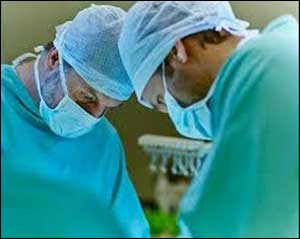- Home
- Editorial
- News
- Practice Guidelines
- Anesthesiology Guidelines
- Cancer Guidelines
- Cardiac Sciences Guidelines
- Critical Care Guidelines
- Dentistry Guidelines
- Dermatology Guidelines
- Diabetes and Endo Guidelines
- Diagnostics Guidelines
- ENT Guidelines
- Featured Practice Guidelines
- Gastroenterology Guidelines
- Geriatrics Guidelines
- Medicine Guidelines
- Nephrology Guidelines
- Neurosciences Guidelines
- Obs and Gynae Guidelines
- Ophthalmology Guidelines
- Orthopaedics Guidelines
- Paediatrics Guidelines
- Psychiatry Guidelines
- Pulmonology Guidelines
- Radiology Guidelines
- Surgery Guidelines
- Urology Guidelines
Indian doctors report a strange case of auto-amputation of Penis

An old patient of more than 82-years was rushed to hospital after his penis fell off on its own. The patient was suffering from a huge ulcer on his penis, as well as severe swelling and skin shedding.
The attending doctors conducted a clinical examination and found that the ulcer caused the man’s penis to drop off.The man had reportedly ignored his symptoms for 12 months before he finally decided to seek medical attention.
During his earlier visit On examination, the doctors found hard lumps down the left side of his groin, despite denying any history of sexually transmitted infection. At that time the doctors drained the pus-filled swelling next to his genitals and he was prescribed antibiotics. But two weeks later he was urgently rushed to hospital after his penis fell off and began to rot.
Dr. Garg the attending doctor told Metro News that: ‘In the present case, the patient neglected his initial symptoms and eventually developed penile auto-amputation, inguinal abscess and widespread metastasis. ‘Auto-amputation of the penis can occur either due to tumour embolism blocking end arteries or due to direct tumour invasion.’
The attending doctors performed surgery to construct a catheter for the man as the loss of his penis damaged his urethra, leaving him unable to go to the toilet. But all the efforts of doctors went in vain and the patient died 15 days later.
The biopsy of the ‘residual penile stump’ showed that he had also had a type of skin cancer, squamous cell carcinoma. Dr Garg said it was likely the man had ignored his worsening condition due to a lack of knowledge about his medical problem.
Penile cancer accounts for less than 1% of all cancers in men. It is a relatively rare squamous cell carcinoma (SCC), a type of non-melanoma skin cancer, this usually occurs on the outer layer.
Carcinoma of penis very rarely presents with autoamputation of the organ which usually happens due to delay in treatment which is attributable to ignorance about disease, personal neglect, denial, embarrassment and fear of emasculation.

Disclaimer: This site is primarily intended for healthcare professionals. Any content/information on this website does not replace the advice of medical and/or health professionals and should not be construed as medical/diagnostic advice/endorsement or prescription. Use of this site is subject to our terms of use, privacy policy, advertisement policy. © 2020 Minerva Medical Treatment Pvt Ltd